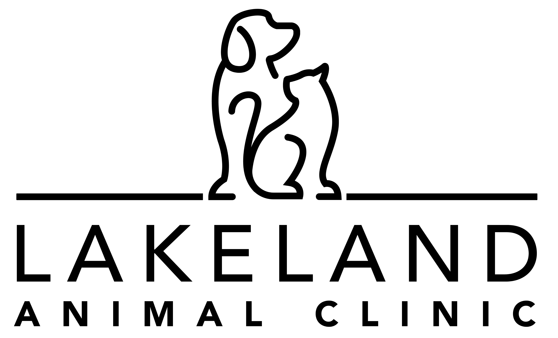Frequently Asked Questions
Full-Service Animal Clinic | Locally Owned | One-on-One Pet Care
Full-Service Animal Clinic
Locally Owned
One-on-One Pet Care
Hours:
Lakeland Animal Clinic FAQ
- We just got a new puppy/kitten. Do we need to see the vet?
Yes! We offer new puppy/kitten checkups, where they get 3-4 rounds of shots. After their shots, we recommend yearly visits with a full exam by the vets and the additional shots needed to keep them healthy.
- How can I make my pet feel more comfortable at the vet?
We'd love for you to bring your new puppy or kitten to visit us. We can weigh them, trim their nails and even give them a treat! This will help them be more comfortable during their visits.
- Does my dog/cat need heartworm and flea/tick prevention?
Yes! All dogs/cats need heartworm and flea/tick prevention for life. We recommend starting on prevention at six months old. We offer a wide variety of these treatments to choose from and our vet will help you decide which is the right one for your fur baby.
- What is the best food for my dog or cat?
There are many pet foods out there on the market. We recommend premium diets such as Purina, Science Diet and Royal Canin.
- Why does my pet's breath stink?
The most likely explanation is dental disease. Bring your pet in for a yearly checkup and we'll be able to determine if your pet needs a dental cleaning.
- Why does my pet drink and urinate a lot?
There are several reasons, some of which can be very serious. Discussing this issue with our vet will help determine if testing is needed. Our in-house diagnostics can help us rule out diabetes, liver disease and/or Cushing's disease.
- How often should I bathe my dog?
Most dogs without any skin conditions only need a bath every 4-6 weeks. Bathing your dog too often can cause dry skin.
- What are some common plants that can be toxic to my pet?
Some plants can give your dog diarrhea and others are more toxic, which can cause serious, life-threatening damage. Please keep your dogs away from the following:
- Sago palm - These are toxic to all pets. The leaves and bark are harmful, but the seeds or nuts are the most toxic part.
- Tulips - Tulip leaves can upset your dog's stomach. However, a newly planted bulb has the most toxins, so watch out if you have a dog that digs.
- Lily of the Valley - Exposure to any part of the leaves or blooms can cause heart problems in dogs. Eating the leaves or blooms can cause your dog to vomit, have low blood pressure, disorientation, seizure or even a coma.
- Oleander - Every part of this popular plant in our area poses major risks and even possible fatality to dogs.
- Philodendrons - These popular house plants contain insoluble calcium oxalate crystals, which can irritate your dog's mouth and lips.
- Azaleas - The most common sign that your dog has eaten azaleas is an upset stomach. If your dog eats a lot of these plants, it can get very weak, have tremors, an irregular heart rate and low blood pressure.
- Aloe Vera - Great for humans, but bad for dogs and cats. Signs of toxic ingestion include vomiting, diarrhea and tremors.
- Begonia - This plant can cause extreme oral irritation and excessive inflammation of the mouth.
For more information about these please see the ASPCA's website. If you think your pet has ingested any of these please seek help immediately, call our office at (601) 939-9322. For 24/7, help please call the Animal Emergency Center at (601) 939-8999 or the APCC 24-hour emergency poison hotline at (888) 426-4435.

Share On: